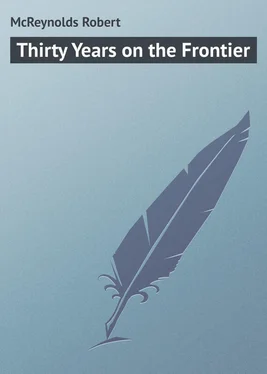Robert McReynolds - Thirty Years on the Frontier
Здесь есть возможность читать онлайн «Robert McReynolds - Thirty Years on the Frontier» — ознакомительный отрывок электронной книги совершенно бесплатно, а после прочтения отрывка купить полную версию. В некоторых случаях можно слушать аудио, скачать через торрент в формате fb2 и присутствует краткое содержание. Жанр: foreign_prose, на английском языке. Описание произведения, (предисловие) а так же отзывы посетителей доступны на портале библиотеки ЛибКат.
- Название:Thirty Years on the Frontier
- Автор:
- Жанр:
- Год:неизвестен
- ISBN:нет данных
- Рейтинг книги:4 / 5. Голосов: 1
-
Избранное:Добавить в избранное
- Отзывы:
-
Ваша оценка:
- 80
- 1
- 2
- 3
- 4
- 5
Thirty Years on the Frontier: краткое содержание, описание и аннотация
Предлагаем к чтению аннотацию, описание, краткое содержание или предисловие (зависит от того, что написал сам автор книги «Thirty Years on the Frontier»). Если вы не нашли необходимую информацию о книге — напишите в комментариях, мы постараемся отыскать её.
Thirty Years on the Frontier — читать онлайн ознакомительный отрывок
Ниже представлен текст книги, разбитый по страницам. Система сохранения места последней прочитанной страницы, позволяет с удобством читать онлайн бесплатно книгу «Thirty Years on the Frontier», без необходимости каждый раз заново искать на чём Вы остановились. Поставьте закладку, и сможете в любой момент перейти на страницу, на которой закончили чтение.
Интервал:
Закладка:
“Look here, Rawlins, suppose you had won, would you shoot Anderson down like a dog this morning?”
“Certainly I would,” he replied, “and he would not be the first dog I have killed, either.”
“This thing cannot go on,” said Olive, decisively. “If you men have got to kill each other you must do it in a civilized fashion. Your plan is too cold-blooded; it has given the shivers to the entire camp.” He then rode over to the “Double Bar” camp, where Anderson lay sleeping.
“Get up from there, you wild ass of the plains,” he shouted. “Rawlins is waiting to be killed. Are you going to do it?”
Anderson was on his feet in an instant, facing Olive in the dim light of the camp-fire.
“It is none of your business what I intend to do!” and his yellow eyes gleamed dangerously as his hand stole to the handle of his sixshooter. Olive was a dangerous man himself and had a record of killing four men in Texas. He saw danger in the manner he had approached Anderson, and using a more conciliatory tone, said:
“Give Rawlins a show for his life and we will all think the more of you for it.”
Finding the sentiment of others who joined in with Olive strong against him, Anderson yielded to a change. This time the principals were to meet upon the plain a mile from camp, mounted and armed with revolvers. They were to fight within a circle of one hundred yards, outside of which they might retreat, reload and return to the combat.
It was a beautiful morning, all balm and bloom and verdure. The face of the sky was placid and benignant. The sun rose like a great golden disc on the purple and pearl of the distant sky line and clouds, airy and gossamer, floated away to the west.
The men stole away from camp in twos and threes, and were gathering on a knoll that overlooked the battle ground, while Rawlins and Anderson were selecting their horses from the remudas. Rawlins chose a Texas mustang, fleet of foot and supple as an Arab. Anderson chose a stocky built animal and appeared altogether indifferent as to any of his qualities. The two men were stationed at the edge of the circle formed of lariats with their backs toward each other.
Olive gave the word, “Ready!” The men grasped their bridle reins tightly and settled themselves in their stirrups.
“Wheel!” The trained horses turned as if upon pivots.
“Fire!” rang out Olive’s clear voice of command.
Anderson rode forward a few paces and stopped. Rawlins dug his spurs into his animal’s side, and came on with a rush, firing his revolver as he came. Four shots sped harmlessly over the plain.
The men were within a few feet of each other when Anderson fired his first shot. Rawlins reeled in his saddle a second, grasped the pommel, and bringing down his revolver sent a bullet through the brain of Anderson.
Both men fell from their horses, and there were two dead faces in the grass.
The horses dashed wildly away, with blood upon their trappings and sleek hides.
Two graves were dug, and the funeral was over before the sun had dried the dew upon the grass.
There was a girl in Nebraska without a lover, and a widowed mother in Texas without a son.
VIII
PLEASANT HALFACRE’S REVENGE
I was with a party of cowboys twenty-five miles west of Ogallala, Nebraska, in 1878, when a huge iron box was found in the sands of the Platte River by one of our party, which recalled a tradition of tragedy and revenge, unequaled in the annals of the west.
In one of those great bends of the Ohio River, opposite Three Mile Island and below the town of Newburgh, in Southern Indiana, there lived some forty years ago, a man who furnished cause for which his neighbors with one accord, joined in deporting him.
Pleasant Halfacre occupied a cabin in a small clearing, which opened on the south, facing the bayou which separated the island from the mainland on the Indiana side. On all other sides for a mile or more was a dense forest, where great hickory, pecan and beech trees furnished the winter provender for the grey squirrels, raccoons and opossums. In some places the woodland was low and swampy; there were great ponds where the water lilies grew and in winter the wild duck and brant paused long in their southern flight to feed. The bayou abounded in catfish and silvery perch.
In this little oasis in a desert of toilers, Halfacre had lived for nearly a quarter of a century. His wife, a big buxom woman, was the mother of eight tow-headed children who, when anyone chanced to come, acted like scared squirrels. They would scamper away into the woods and coyly peep at the stranger from behind big trees, while the dogs kept up an incessant barking.
In summer, the woman and children would cultivate the small clearing with hoes, while Plez would catch catfish and sometimes work in the harvest field a few days for some neighbor. This he did only when dire necessity compelled. The very sight of an agricultural implement, he declared, would make him sweat. The man loved nature and in his simplicity, would go into raptures over the coloring of the gorgeous sunset, or wade about the ponds for hours for water lilies, or the great blue, bell-shaped flowers which grew upon the wild flag and calimus stalks.
He would bedeck his ragged garments with these flowers and, with a string of catfish, would emerge, a gorgeous spectacle, from the forest on his way to the Evansville market.
In winter his children would gather pecans and hickory nuts, while he would take the dogs and hunt raccoons and opossums, the meat of which furnished the family food, while the pelts brought a small price at the market.
In all the forty years of his life, Halfacre had not been twenty miles away from his home. He could neither read nor write and the world to him ended at the blue rim of the northern horizon beyond the cypress hills. The man was totally devoid of any sense of responsibility, either to his Creator, his neighbors or himself. Once when the good preacher, who held services at the “Epworth meeting house” twice a month, reproved him for some misdemeanor by threatening him with the hereafter, he replied, “The devil can’t inflict any more punishment on me than I can stand, if he does, he will kill me.” With this logic to soothe his conscience, and his love of idleness thoroughly gratified, Halfacre was very well contented.
For a long time the neighbors, for many miles around, had been missing articles of small value, the loss of which caused much delay in their work as well as vexation and annoyance.
A farmer would be all ready to go to market and when he came to hitch up, he would find the coupling bolt to his wagon gone, or perhaps the singletree would be missing; or if ploughing in the field he would take the horses out to where he had left the plow the night before and find that the clevis or some bolts had been stolen. The good matrons would have their dinner horns or bells taken away at night. Nothing of any considerable value was stolen and no organized search was made until one day, Farmer Beasley was floating down the bayou in a dinkey boat when he came upon one of Plez Halfacre’s children sitting on the bank eating mush and milk out of the blue flowered shaving mug which old Tippecanoe Harrison had presented to his grandfather, while another one of the Halfacre children sat upon a log, making a paw-paw whistle with his ancestor’s razor.
This was too much for Farmer Beasley. He turned the dinkey boat around, paddled back to Newburgh and swore out a search warrant for the Halfacre cabin.
In the loft they found a collection of articles which was a wonder to behold. There were grindstones, iron wedges for splitting rails, harrow teeth and a miscellaneous lot of plunder, enough to start a second hand store.
The word was passed and the next day the farmers began to assemble. They came by the score; some in wagons bringing the entire family and their dinners, and the day was spent identifying stolen articles.
Читать дальшеИнтервал:
Закладка:
Похожие книги на «Thirty Years on the Frontier»
Представляем Вашему вниманию похожие книги на «Thirty Years on the Frontier» списком для выбора. Мы отобрали схожую по названию и смыслу литературу в надежде предоставить читателям больше вариантов отыскать новые, интересные, ещё непрочитанные произведения.
Обсуждение, отзывы о книге «Thirty Years on the Frontier» и просто собственные мнения читателей. Оставьте ваши комментарии, напишите, что Вы думаете о произведении, его смысле или главных героях. Укажите что конкретно понравилось, а что нет, и почему Вы так считаете.












